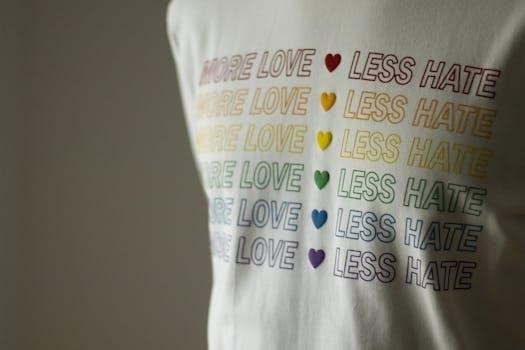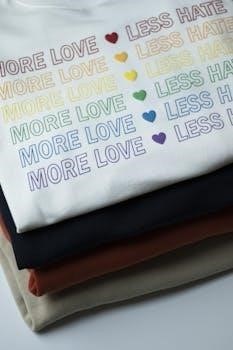The Hate U Give⁚ A Deep Dive
Angie Thomas’s acclaimed novel, “The Hate U Give,” is widely available in PDF format, offering readers access to this powerful story digitally. Numerous platforms host the PDF, allowing for easy download and online reading, facilitating exploration of its crucial themes and characters.
Availability of “The Hate U Give” in PDF Format
The PDF version of “The Hate U Give” is readily accessible across various online platforms. Readers can find it on academic resource sites like Perlego, which offers a vast library of books, including this title, in both PDF and ePUB formats. Additionally, numerous websites dedicated to book sharing and digital libraries also host the PDF, making it convenient for individuals to download and read. These digital versions allow for easy access, often including features like searchable text and adjustable font sizes for a more comfortable reading experience. The availability of “The Hate U Give” in PDF format significantly broadens its reach, catering to a modern audience that favors digital reading. Furthermore, many educational institutions and online study platforms may also provide access to the PDF as part of their resources, ensuring students have the necessary materials for academic purposes. The widespread presence of the PDF underscores the novel’s significance and popularity, facilitating its consumption and study. This format democratizes access, allowing for a wider audience to engage with the story and its crucial themes of social justice and identity.
Where to Find “The Hate U Give” PDF
Locating a reliable source for “The Hate U Give” in PDF format can be achieved through various avenues. Primarily, educational platforms like Perlego are excellent starting points, offering not only the PDF but also a wide range of academic resources. Online libraries and digital book repositories are other common places where the PDF is often hosted, sometimes requiring a subscription or a simple registration. It’s also worth exploring websites that focus on sharing digital content, such as those dedicated to literature or e-books, though users should always ensure the legitimacy of these sources. Furthermore, some school or library websites may provide the PDF as part of their online reading programs or study materials. Checking reputable book-sharing forums or communities online can also yield results, but caution should always be exercised to avoid downloading from untrustworthy sites. Always verify that the source is legitimate and that the file is not compromised. By exploring these various resources, readers should be able to find a reliable and convenient way to access the PDF of “The Hate U Give,” enabling them to engage with this impactful story.
Publishing Details of “The Hate U Give”
“The Hate U Give,” a notable work by Angie Thomas, was initially published by Balzer + Bray in 2017. This debut novel quickly gained recognition for its compelling narrative and exploration of social issues. The book’s publication marked a significant moment in young adult literature, introducing a story that resonated deeply with readers across diverse backgrounds. The publishing details are crucial in understanding the context and reception of the novel. It is important to note the original publisher, Balzer + Bray, as that often signals the book’s initial release and print run. Furthermore, the 2017 publication year situates the novel within a particular cultural and social moment, which is important for understanding its themes. Different editions and versions, including those in PDF format, may carry slightly different publishing information. However, the original publisher and year remain constant, serving as key details for identifying and referencing the book. Understanding these publishing specifics allows researchers, students, and readers to properly trace the book’s history and impact. It also aids in distinguishing between authentic copies and potentially unauthorized versions of the text.
Flip PDF Versions and Online Reading

The digital availability of “The Hate U Give” extends to flip PDF versions, which offer an interactive reading experience. These flip PDFs mimic the feel of flipping through a physical book, enhancing engagement for online readers. Platforms often host these versions, allowing users to navigate pages with ease. This format is particularly appealing to those who prefer a more visual and dynamic interaction with the text. Online reading options are also abundant, with websites and digital libraries providing access to the novel. These platforms often offer features such as adjustable font sizes and background colors, catering to individual reading preferences. The use of flip PDF versions and online reading capabilities broadens the accessibility of “The Hate U Give,” making it available to a wider audience. Such digital options cater to diverse learning styles and reading habits. Furthermore, these digital versions often include search functionalities, enabling readers to quickly find specific passages or keywords within the text. This feature can be particularly helpful for academic research or classroom discussions. The ease of access and user-friendly interfaces make online reading an attractive option for many.

Key Themes and Social Issues
“The Hate U Give” delves into several critical themes and social issues, making it a relevant and powerful read. The novel prominently addresses issues of racial injustice and police brutality, showcasing their devastating impact on communities. Identity is another central theme, as the protagonist, Starr Carter, navigates her life between two vastly different worlds⁚ her poor neighborhood and her predominantly white prep school. The novel also explores the complexities of code-switching, where individuals change their behavior based on their environment. Furthermore, “The Hate U Give” tackles the concept of systemic racism, illustrating how it can permeate various institutions and aspects of life. Social activism is another key theme, as the characters grapple with how to respond to injustice and fight for change. The narrative highlights the importance of finding one’s voice and speaking out against oppression. The book touches on issues of grief and trauma, as Starr processes the loss of her childhood friend, Khalil, at the hands of a police officer. The novel promotes discussions about these issues and encourages empathy and understanding. The exploration of these themes makes the novel a valuable resource for education and social awareness.
Character Summaries and Analysis
“The Hate U Give” presents a cast of complex and compelling characters, each contributing to the novel’s powerful narrative. Starr Carter, the protagonist, is a sixteen-year-old who navigates the challenges of living in two different worlds, which makes her a relatable and dynamic character. Her internal struggles and growth are central to the story. Khalil, Starr’s childhood friend, represents the many victims of police brutality and serves as a catalyst for the events of the story. Starr’s parents, Maverick and Lisa, offer contrasting yet supportive perspectives. Maverick, with his strong community ties, and Lisa, with her desire for safety and stability, create a complex dynamic within Starr’s family. Starr’s uncle, Carlos, provides additional support and guidance. Starr’s friends, Hailey and Maya, represent different reactions and understanding of racial issues, highlighting the challenges Starr faces in her personal relationships. Seven, Starr’s older brother, often serves as a voice of reason and protection. Chris, Starr’s boyfriend, a white student, offers a glimpse into how race plays out in interracial relationships. The novel carefully analyzes the characters’ motivations and their effect on the central themes of the book, providing a deep exploration of their roles in the narrative and their impact on Starr’s journey.
Plot Overview and Key Events
The plot of “The Hate U Give” centers on Starr Carter, a sixteen-year-old who witnesses the fatal shooting of her childhood friend, Khalil, by a police officer. This event shatters the delicate balance Starr maintains between her poor neighborhood and her predominantly white suburban prep school. The narrative unfolds as Starr grapples with the trauma of witnessing this violence and the complexities of speaking out. Key events include the immediate aftermath of the shooting, the protests that erupt in Garden Heights, and Starr’s struggle to decide whether to testify in the grand jury investigation. The story follows Starr’s internal battle as she confronts issues of race, identity, and social injustice. The novel explores the different reactions of the community, the media, and Starr’s friends and family. The central conflict revolves around Starr’s decision to find her voice. The climax of the plot involves Starr’s courageous testimony and the ensuing consequences within her community. The book also examines the concept of “THUG LIFE” and its meaning in the context of the story. The plot is fast-paced and engaging, addressing a range of social issues. The ending offers both closure and a continued call for action.
The Meaning of “THUG LIFE” in the Novel
In “The Hate U Give,” the acronym “THUG LIFE” is a recurring theme, deeply intertwined with the novel’s exploration of systemic oppression. The acronym, originally popularized by Tupac Shakur, is explained in the book as “The Hate U Give Little Infants Fucks Everybody.” This definition underscores the cycle of poverty, violence, and injustice that disproportionately affects marginalized communities. The novel portrays how societal neglect and lack of opportunities can lead to destructive behaviors, which then perpetuate the cycle. “THUG LIFE” in the context of the book, serves as a critique of how society’s shortcomings impact young people. It’s not a glorification of violence but an explanation of how the environment can shape lives. The novel uses this concept to highlight the systemic issues that contribute to the problems faced by characters like Khalil. It challenges readers to consider the root causes of the challenges faced by young people in marginalized communities. It also serves as a reminder that the way society treats its youth reflects its values and priorities. The novel’s understanding of “THUG LIFE” is a powerful social commentary, challenging readers to reflect on their own roles in perpetuating or dismantling cycles of hate and injustice. This is a central theme to the novel.

Critical Reception and Reviews

“The Hate U Give” has garnered widespread critical acclaim for its powerful narrative and unflinching portrayal of social issues. Critics have lauded Angie Thomas’s ability to craft compelling characters and a thought-provoking story that resonates with readers of all backgrounds. The novel’s exploration of race, identity, and police brutality has been praised for its honesty and sensitivity. Many reviews highlight the book’s emotional impact, noting that it effectively conveys the experiences of marginalized communities. The book’s accessibility for young adult readers has also been a point of praise, as it introduces complex topics in an engaging way. Reviewers have commended the novel’s ability to spark important conversations about systemic racism and social injustice. The book’s authentic voice and nuanced characters have been repeatedly mentioned as strengths. Some critics have noted the book’s relevance to contemporary events, highlighting its importance in understanding current social dynamics. “The Hate U Give” has not only been praised for its literary merits but also for its social impact, making it a significant contribution to the young adult literature canon. The Guardian Book Review called it an “outstanding debut novel”. The novel’s success has been attributed to its ability to blend a captivating plot with serious social commentary.
The Hate U Give⁚ Adaptations and Film
The immense popularity and cultural impact of “The Hate U Give” led to its adaptation into a critically acclaimed feature film. The film, directed by George Tillman Jr., brought the novel’s powerful story to a wider audience, further amplifying its message. The movie adaptation starred Amandla Stenberg as Starr Carter, who delivered a performance that resonated with both fans of the book and new viewers. The film adaptation closely followed the narrative of the novel, capturing the essence of the characters and their struggles. The cinematic portrayal of Garden Heights and the complexities of Starr’s dual life effectively translated the book’s themes to the screen. Critics praised the film for its faithful adaptation and its commitment to the core message of the novel. The film’s success in capturing the emotional depth and social commentary of the book contributed to its positive reception. The movie served as a valuable educational tool, sparking important discussions about race and social justice. The adaptation also brought the novel to the forefront of public consciousness, solidifying its place in contemporary culture. The adaptation’s success led to increased awareness of the novel and its significant themes, reaching new audiences who may not have engaged with the book initially. The film is considered a successful adaptation that honored its source material.
Educational Use and Study Resources
“The Hate U Give” has become a valuable resource in educational settings, prompting crucial conversations about race, identity, and social justice. Its relevance to contemporary issues makes it a powerful tool for engaging students in meaningful discussions. Numerous educational resources, including study guides and lesson plans, have been developed to aid teachers in incorporating the novel into their curriculum. These resources often include character analysis, thematic explorations, and discussion questions to facilitate deeper comprehension. The book’s challenging themes encourage critical thinking and empathy among students. The availability of the novel in PDF format enhances its accessibility for educational purposes, allowing easy distribution to students. Many online platforms offer supplementary materials, like character summaries and plot overviews, to support students’ understanding. Educators use “The Hate U Give” to address complex social issues in a safe and structured environment. The novel’s exploration of police brutality and systemic racism provides opportunities for important dialogues in the classroom. Furthermore, the resources available often cater to various educational levels, ensuring the book’s adaptability across different age groups. The study of “The Hate U Give” promotes media literacy and critical engagement with contemporary societal issues. The novel’s impact extends beyond the classroom, creating a platform for critical conversations about social justice.
Impact and Relevance of the Novel
“The Hate U Give” has made a significant impact on contemporary literature and discussions about social justice, resonating deeply with readers of all backgrounds. The novel’s unflinching portrayal of systemic racism and police brutality has sparked critical conversations and fueled important dialogues. Its relevance lies in its ability to reflect the experiences of marginalized communities, giving voice to often unheard perspectives. The book’s exploration of identity, code-switching, and the complexities of navigating different worlds makes it particularly relevant to young adults. The novel’s impact is evident in its widespread adoption in educational settings, serving as a catalyst for crucial conversations about race and inequality. “The Hate U Give” has been recognized with numerous awards and accolades, solidifying its place as a significant work of literature. Its accessibility, partially due to its availability in PDF format, has allowed its message to reach a broader audience. The novel’s themes continue to be relevant as they reflect ongoing societal issues, fostering empathy and prompting readers to confront uncomfortable truths. Furthermore, the story’s powerful narrative encourages critical thinking and activism among readers, inspiring them to advocate for positive change. The book serves as a mirror to society, reflecting its complexities and challenging readers to engage in meaningful discussions about injustice. The impact of “The Hate U Give” extends beyond literature, influencing conversations in various social and political spheres.

Leave a Reply
You must be logged in to post a comment.